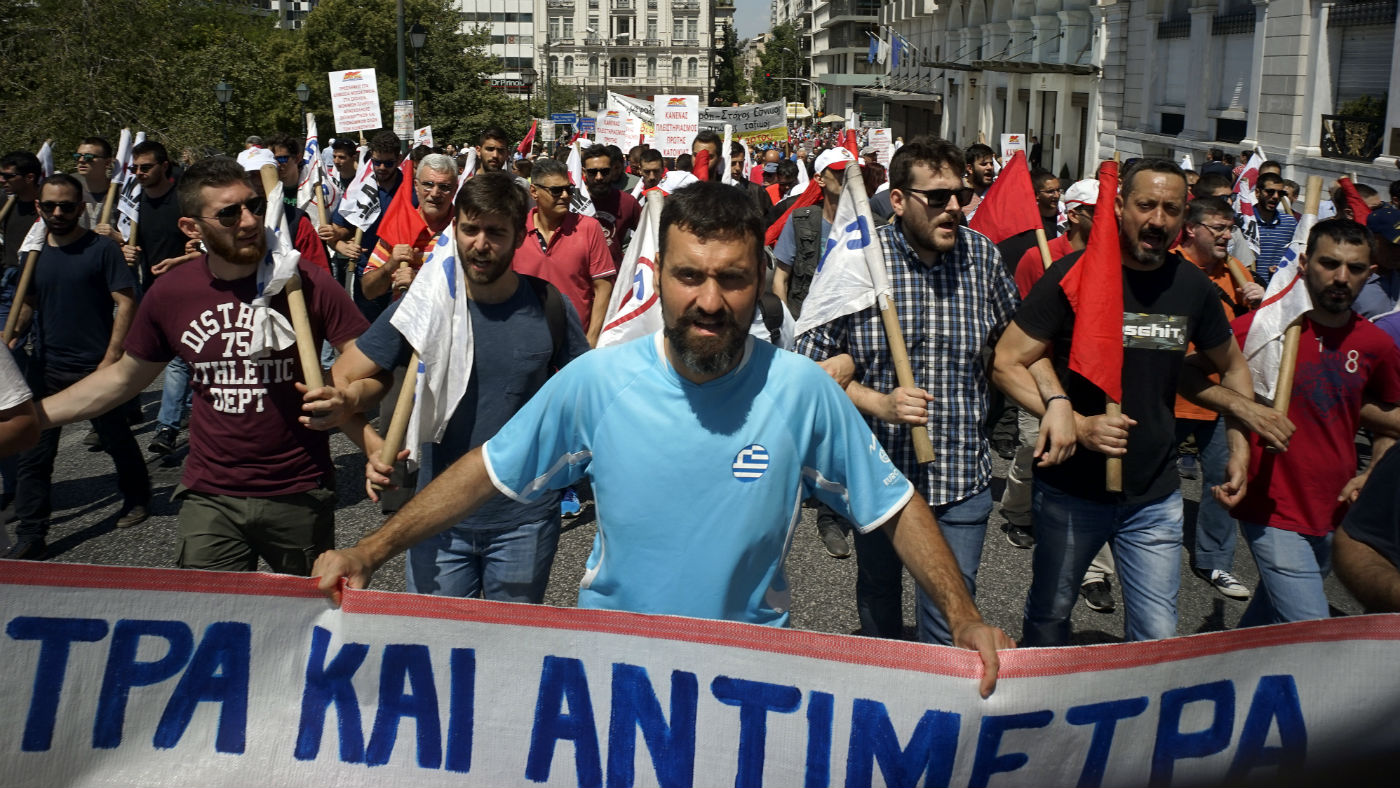Eurozone bailout programme finally ends
Final payment to prop-up countries following the financial crisis made to Greece on Monday

A free daily email with the biggest news stories of the day – and the best features from TheWeek.com
You are now subscribed
Your newsletter sign-up was successful
Today marks an important milestone for the eurozone as the Greek bailout finally comes to an end, the last country to receive emergency loans in the wake of Europe's financial crisis.
Greece will exit its third bailout programme today having borrowed more than €288 billion, the biggest bailout in global financial history, over eight years.
Now, the country’s creditors believe Greece is able to stand on its own two feet.
The Week
Escape your echo chamber. Get the facts behind the news, plus analysis from multiple perspectives.

Sign up for The Week's Free Newsletters
From our morning news briefing to a weekly Good News Newsletter, get the best of The Week delivered directly to your inbox.
From our morning news briefing to a weekly Good News Newsletter, get the best of The Week delivered directly to your inbox.
Greece, Ireland, Portugal, Spain and Cyprus all received huge loans in the years following the crash, and “at the most intense points of the crisis there were genuine doubts about whether the eurozone would survive, or at the very least whether some countries would drop out”, says the BBC.
While the root of the crises varied from country to country, from a construction and property crash to weak economic growth that undermined tax revenue, there were similarities in the consequences, in particular a poisonous interaction between stressed government finances and stressed banks.
Ten years on from the crash and eight years since Greece first received a bailout, governments across Europe have been forced to implement a programme of spending cuts and tax rises that have had a severe impact on public services and living standards.
Some have argued that far from saving the troubled eurozone economies, the bailout and harsh steps to reduce government borrowing which accompanied them aggravated economic problems, and will continue to be felt for decades to come.
A free daily email with the biggest news stories of the day – and the best features from TheWeek.com
Many countries fell into recession, with Greece’s economy falling 28% while unemployment rose to 28%, and 50% among young people at its peak.
In Greece, Reuters reports the country’s international bailouts “took aim at its pension system and more than a dozen rounds of cuts pushed nearly half its elderly below the poverty line”.
Monday’s exit “is a welcome milestone” says CTV News, “but it offers little assurance that the 19-country euro currency union has left behind its problems with debt. The huge debt pile in Greece and an even bigger one in Italy will remain a lurking financial threat to Europe that could take a generation to defuse”.
Nevertheless, almost exactly ten years to the day since the collapse of Lehman Brothers and the start of the financial crisis, the eurozone is once again growing albeit slowly, in part because the bailout staved off complete economic collapse that threatened its very survival.
-
 The ‘ravenous’ demand for Cornish minerals
The ‘ravenous’ demand for Cornish mineralsUnder the Radar Growing need for critical minerals to power tech has intensified ‘appetite’ for lithium, which could be a ‘huge boon’ for local economy
-
 Why are election experts taking Trump’s midterm threats seriously?
Why are election experts taking Trump’s midterm threats seriously?IN THE SPOTLIGHT As the president muses about polling place deployments and a centralized electoral system aimed at one-party control, lawmakers are taking this administration at its word
-
 ‘Restaurateurs have become millionaires’
‘Restaurateurs have become millionaires’Instant Opinion Opinion, comment and editorials of the day
-
 Epstein files topple law CEO, roil UK government
Epstein files topple law CEO, roil UK governmentSpeed Read Peter Mandelson, Britain’s former ambassador to the US, is caught up in the scandal
-
 Iran and US prepare to meet after skirmishes
Iran and US prepare to meet after skirmishesSpeed Read The incident comes amid heightened tensions in the Middle East
-
 Israel retrieves final hostage’s body from Gaza
Israel retrieves final hostage’s body from GazaSpeed Read The 24-year-old police officer was killed during the initial Hamas attack
-
 China’s Xi targets top general in growing purge
China’s Xi targets top general in growing purgeSpeed Read Zhang Youxia is being investigated over ‘grave violations’ of the law
-
 Panama and Canada are negotiating over a crucial copper mine
Panama and Canada are negotiating over a crucial copper mineIn the Spotlight Panama is set to make a final decision on the mine this summer
-
 Why Greenland’s natural resources are nearly impossible to mine
Why Greenland’s natural resources are nearly impossible to mineThe Explainer The country’s natural landscape makes the task extremely difficult
-
 Iran cuts internet as protests escalate
Iran cuts internet as protests escalateSpeed Reada Government buildings across the country have been set on fire
-
 US nabs ‘shadow’ tanker claimed by Russia
US nabs ‘shadow’ tanker claimed by RussiaSpeed Read The ship was one of two vessels seized by the US military